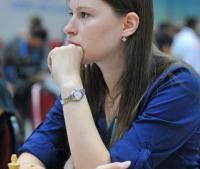
Rating Fears
Chess ratings are used as a tool for evaluating the current playing strength of a person. However, it is important to remember that it is the average number, while in a single game one can perform way above or below his rating. This can be connected with psychology, general wellbeing, chess shape and other factors. Also, there are underrated players (e.g. bright juniors who got a low initial rating), or overrated (e.g. people who have not had any practice for a few years and then returned to chess). When preparing for the game, don’t dwell too much on the rating of your opponent.
A lot of psychological problems may be associated with ratings. For example, some people are afraid of higher-rated opponents and fear not winning against a lower-rated one. This is caused by the wrong attitude to chess. Unlike chess engines, we do not have a fixed playing strength. A player who believes in himself will score better than a pessimist of equal skill. Anger and fear leads to the Dark Side causes blunders, while trusting in one’s powers gives additional strength. One should be aimed at improvement: learning new information, becoming healthier, harmoniously developing one’s personality.
Another common situation is facing someone with a lower rating. Most chess players switch to must-win mode in such cases. The thinking process goes like this: he is weaker, so I must beat him; if I don’t win against him, then against whom?; other opponents are stronger, so if I don’t win now, I will lose rating points. And so on. Your thoughts can be different, but the result is the same: this “must-win” attitude is sapping energy and increasing the tension. Also, you may start playing inadequately: first taking unnecessary risks against a lower-rated opponent, then forgetting to switch gears and going all-in against a higher rated one, thus committing chess suicide. All this leads to loss of points and disappointment. Let’s review the previously mentioned thesis once again. People do perform differently in each given game (e.g. a player rated 2000 may play one game at 1800-level, the other at 2000, and the third at 2200). Forget about ratings before the game, believe in your powers and go for a win, while trying to take advantage of your opponent’s weaknesses. Aim for constant improvement and get rid of the “must” attitude. You don’t owe anything to anybody at the chess board.
The other side of the medal is playing against a higher-rated opponent. If you remind yourself of the fact that one’s playing strength may vary, then why can’t you beat that guy? Everyone makes mistakes. Sticking to the above-mentioned example, if you are a 2000, you can try to do your best and perform at, let’s say, 2200. If your 2400-rated opponent has a bad day, he will also be playing at 2200. Now it’s an equal match all of a sudden! Of course, there is a certain chance that he will be in his top shape too (and play close to 2600). But you shouldn’t be afraid of that either: in this case you will learn a valuable lesson over the board and become stronger. Therefore, don’t be intimidated by your titled and stronger opponents. At the end of the day not only the result of the game, but the experience matters. Treat all your opponents with equal respect. Everyone is vulnerable, even chess engines. In chess the strongest player during each given game wins, not the one who has more respect in the professional community, or a higher rating.
Today I would like to share with you annotations to a first-round game from the Polugaevsky Memorial. As I was seeded in the upper half, in the 1st round I got a significantly lower-rated opponent. During the game I didn’t bug myself with must-win thoughts, but simply tried to exploit my opponent’s mistakes. From reviewing his games I understood that he wasn’t good at tactics, so I tried to spice up the position. He attempted to avoid complications and made a seemingly solid move 13.e4, which in reality was a serious mistake that I managed to take advantage of.






